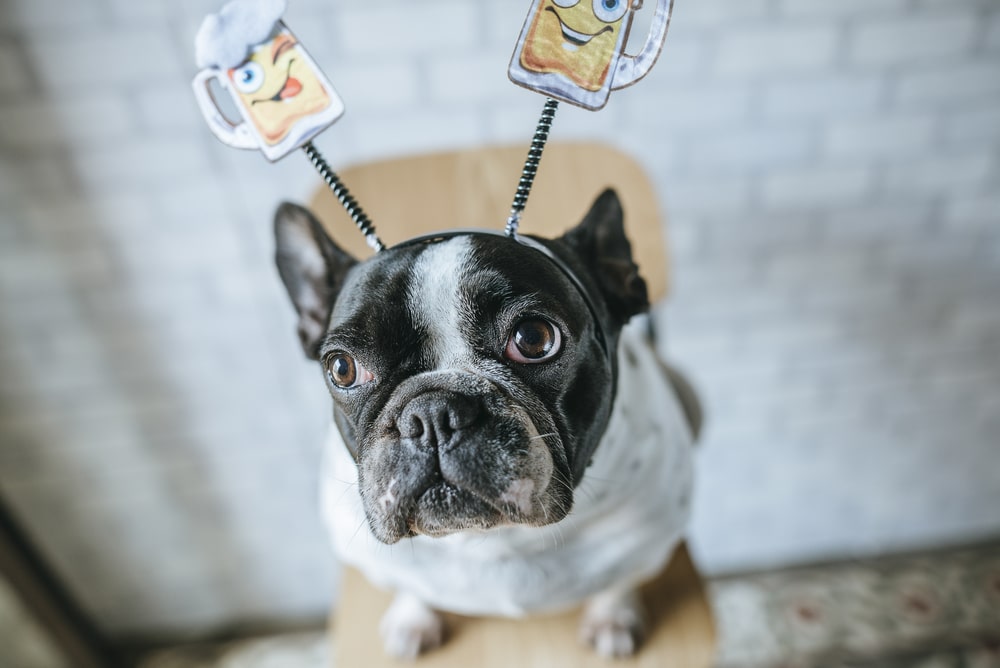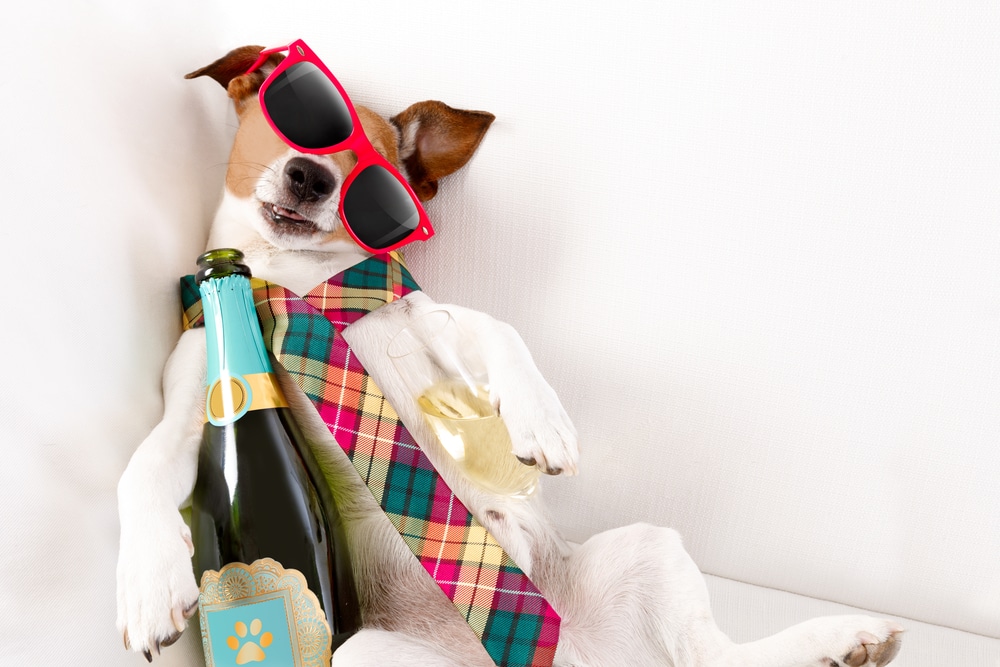Did you ever leave your glass of wine half-full and found it empty the next morning? Maybe your curious dog just wanted to check for treats. Accidents like this are not common, but they happen. Stick with us and find the answers to, “What does alcohol do to a dog?”
Alcohol does nothing good to a dog. Ultimately, alcohol causes a variety of symptoms in dogs such as vomiting, diarrhea, disorientation, drooling, loss of body control, difficulty breathing, loss of consciousness, seizures, heart rhythm problems, and can even lead to death from respiratory problems, low body temperature, low blood sugar, or metabolic acidosis. Please always keep alcohol away from your dog, and if you think it has ingested some, contact your vet or animal poison control right away.
Table of Contents
Can Dogs Drink Alcohol?
Even if they’re over 21 in dog years, drinking alcohol is off the table for dogs. None of the dog breeds can drink alcohol. Lethargy, respiratory depression, and dangerously low body temperature are all effects of alcohol in dogs.
Some of your everyday household products such as hand sanitizers, disinfectant sprays, detergents, soaps, and shampoos contain alcohol. Some of these products also have toxic chemicals. Rubbing alcohol, for instance, has isopropanol, a highly toxic chemical compound.
How Dogs Come Into Contact With Or Ingest Alcohol

That being said, it is unfortunately not that hard for a dog to come in contact with alcohol.
Furthermore, due to excessive usage of alcohol-based flea sprays and alcohol-containing detergents, there are documented cases of skin-exposure poisoning as well. So, these products must be kept out of the reach of children and animals, just like other household hazards.
Another method that dogs can become poisoned by alcohol is to eat uncooked, yeast-containing bread dough. Alcohol is produced as a byproduct of the fermentation of the yeast in the stomach and is absorbed through the stomach wall and into the bloodstream which may result in alcohol toxicosis.
Although our pets are naturally interested and can easily become poisoned by ingesting stuff like hand sanitizer and antifreeze, the majority of occurrences of alcohol poisoning in dogs result from the ingestion of alcoholic drinks left unattended or spilled.
Do Dogs Like Alcohol?
Dogs don’t find the taste of alcohol appealing, most of the time though. So there’s a chance that even if your dog sneaks a sip of alcohol, they won’t come back for more.
On the other hand, they may be drawn to alcoholic fruit-based drinks, cocktails, punches, ciders, and seltzers more than other types of beverages. Besides the alcohol being bad for them, diet alcoholic beverages include xylitol, an artificial sweetener that can be lethal to dogs.
Hazards of Alcohol for Dogs
The first things that come to mind when we consider pet poisoning are human foods and pesticides like rat bait and weedkillers. We commonly overlook alcohol as a poison.
Your dog’s health could be affected by any amount of alcohol, including a sip from your glass or a dog licking beer off the kitchen floor. Negative outcomes of both moderate and severe cases could include some of the mentioned below:
- It can have the same effects on dogs as it does on people: slowing down and weakening the central nervous system and resulting in a lack of coordination and drowsiness. These effects will be substantially worse for dogs.
- Alcohol can cause dogs to develop the potentially fatal condition known as metabolic acidosis. Numerous negative consequences result from this sudden increase in acidity. Some of them are heart attacks, hypothermia, respiratory depression, and dangerously low heart rate and blood pressure.
- Alcohol use can result in dangerously low blood sugar levels. The symptoms of hypoglycemia include weakness, tiredness, and convulsions.
- Alcohol can quickly irritate your dog’s digestive tract, causing excessive drooling and stomach trouble, including vomiting and diarrhea, as well as other gastrointestinal symptoms.
What Happens If a Dog Ingests Alcohol?
In as little as 30 minutes, alcohol is absorbed into the bodies of our pets. This hazardous chemical is quickly absorbed through the skin as well. Therefore, toxicity develops quickly.
Within 30 to 60 minutes after ingesting dangerous levels of alcohol, dogs start to show negative effects. From mild intoxication to severe inebriation that can be fatal, there are a variety of possible symptoms.
Your dog may show signs of poisoning, such as:
- Vomiting and diarrhea
- Disorientation
- Drooling
- Loss of bodily control
- Hypersalivation
- Difficulty breathing
- Loss of consciousness
- Seizures
- Heart rhythm problems and others
Death can occur due to:
- Respiratory distress
- Low body temperature
- Low blood sugar
- Metabolic acidosis
If your dog inhales its vomit, there is a chance that he will develop aspiration pneumonia.
What to Do if Myg Dog Accidentally Drinks Alcohol?
The first thing you should do is take the drink or the source of alcohol from them right away. You should keep an eye out for any of the previously mentioned symptoms in your dog.
Although your dog may exhibit symptoms as soon as a few minutes after ingestion, you should still get to the veterinarian as soon as possible. They can determine if you should bring in your dog for observation or treatment.
The packaging (the pill bottle, flea spray, or rubbing alcohol bottle, for instance) will help the veterinary team identify the specific sort of alcohol poisoning they are dealing with, so make sure to bring that with you, if you can.
When you arrive, your dog’s vital signs will be taken by your veterinarian, who will look for any respiratory problems or heart rate deviations. A blood test can evaluate the health of the kidneys and liver. The veterinarian’s top priority will be to stabilize your dog.
Is It Ever OK to Let My Dog Have a Sip of My Drink?
The truth is that you should never allow your dog to consume alcohol, even if it seems harmless to let them have a tiny sip of your wine, beer, or mixed drink. No matter how funny it might be, risking your dog’s health is never acceptable. Your duty as a pet parent is to keep your dog safe, which includes preventing it from drinking.
Although you cannot entirely control your pet’s surroundings or what they eat, knowledge and awareness are the greatest places to start if you want to keep your dog healthy. Your keen eye for symptoms of food poisoning or toxic reactions from everyday objects could mean the difference between a dog’s life and death.
How To Prevent My Dog From Ingesting Alcohol
Here are some simple guidelines to help keep your dog away from alcohol in the future:
- Keep all alcohol in your possession out of your dog’s reach.
- Never leave alcohol unattended. Before going to bed at night, make sure to discard or store any leftover alcohol in the refrigerator.
- Talk to your visitors and make sure they all realize that giving your dog a drink at any time is not acceptable if you are hosting a social gathering.
- If there are spills, make sure to remove your dog from the area as soon as you can, and then worry about cleaning up.
Frequently Asked Questions
Here are some answers to other questions you might have about a dog and alcohol.
Is alcohol poisoning common in dogs?
When it comes to pet ownership, education is essential. The majority of owners are aware that it is not a good idea to give their pets alcohol. Nevertheless, accidents can happen from time to time.
Additionally, there have been increased instances of dogs being exposed to alcohol due to the popularity of alcohol-based hand sanitizers, many of which contain more than 70% ethanol.
How long does it take for alcohol to affect dogs?
Depending on the size of the sip, as well as the size of your dog, it could be roughly 30 to 60 minutes until you notice some symptoms.
What happens if my dog licks alcohol?
It can be difficult to determine whether your dog has accidentally taken a toxic amount of alcohol. It is important to take into account the dog’s weight and overall health in relation to the type and volume.
Depending on the chemical being consumed, different amounts of ethanol are required to become intoxicated. The reported oral ethanol fatal dosage in dogs is 5.5 to 7.9 g/kg.
However, if you suspect your dog has ingested any amount of alcohol, we recommend contacting your vet or animal poison control right away.
To Sum Up: What Does Alcohol Do To A Dog?
It may not be the most common poison, but alcohol is still something you should never give to a dog. The effects can vary depending on your dog, the amount, and the type of alcohol, but you should always look for signs of poisoning and contact your vet or animal poison control as soon as possible.
Has your dog ever attempted to consume alcohol secretly? How do you make sure your dog doesn’t ingest alcohol? Tell us your stories, tips, and other thoughts in the comments section below!
